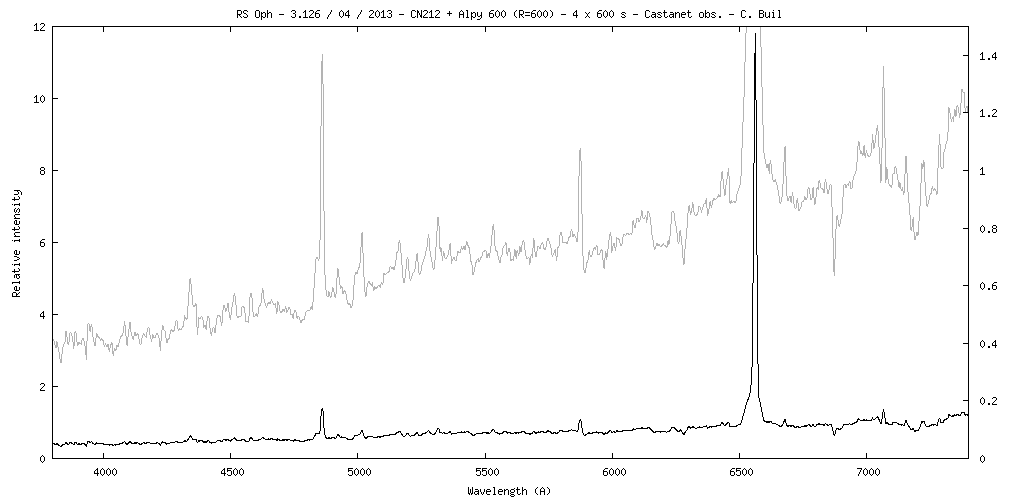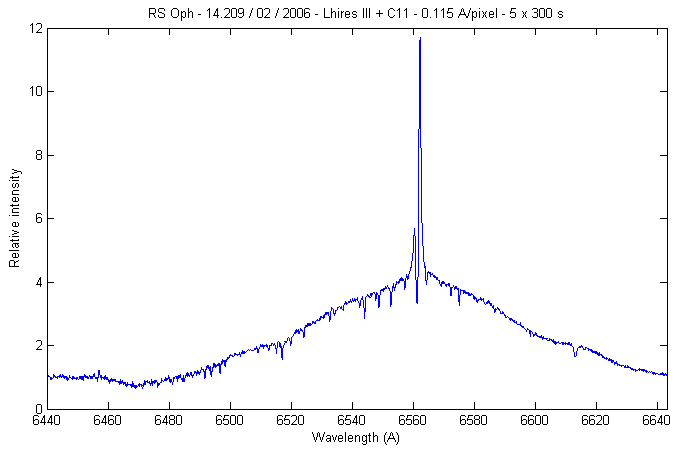
Detail of the Ha emission:
SYMBIOTIC STAR
RS OPHIUCHI
The page monitor the 2006 outburst of
RS Oph (cf. IAUC
4030, 4031) - see IAUC 8671.
The star shows 5 recorded
outbursts with irregular frequency: 1898, 1933, 1958, 1967, and 1985.
Position: R.A. = 17h50m13.530s,
Decl. = -06°42'30.60'' (equinox 2000.0)
February 14.209 UT 2006 Observation (at V magnitude near 5.0)
Observatory: Castanet Tolosan (France)
- IAU959
Observer: Christian Buil
Instrument: Celestron
11 telescope (0.28 m diameter) - LHIRES3
spectrograph with a 2400 g/mm grating (sampling of 0.115 A/pixel) + Audine KAF-0402ME CCD.
Three individual spectra are associated for cover a wide spectral range.
Spectrum normalized at the wavelength 6450 A - telluric lines are not removed:

Detail of the Ha
emission:
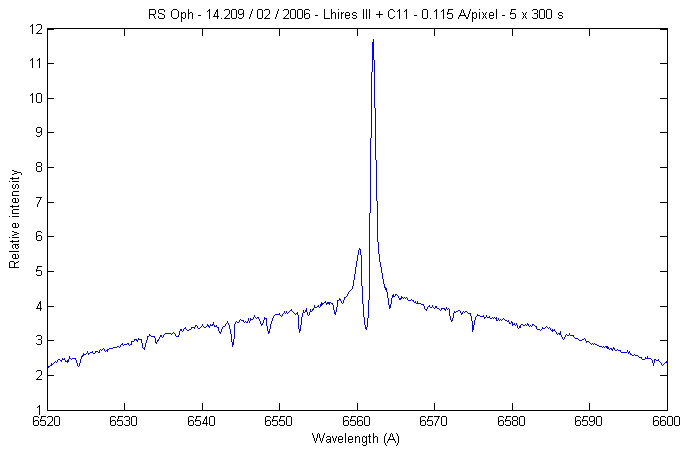
Detail
of possible P Cygnii near H-alpha (the faint emission line at 6457 A is real):
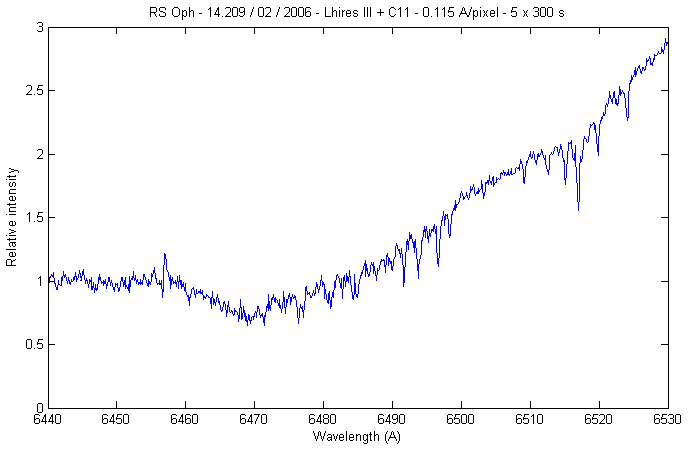
Comparison of the RS spectrum and the Vega spectrum (Alpha Lyr) taken the same night for calibration purpose:
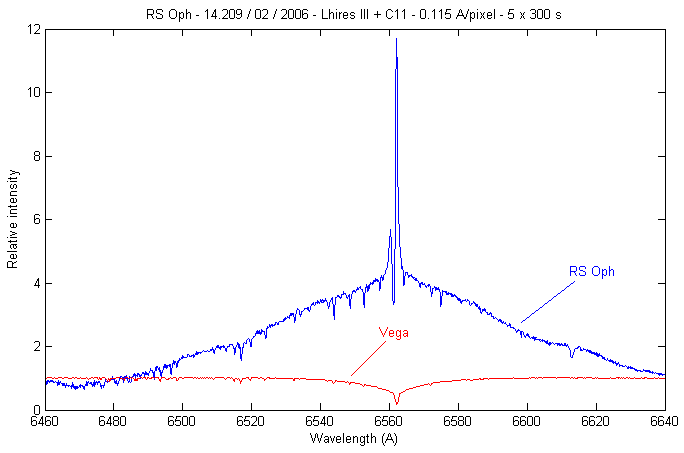
A possible explanation about the two major features of the H-alpha spectral profile, derived from literature. The RS Oph is composed by a white dwarf (the primary component) orbiting in the wind of red giant (the secondary component of spectral class M0 III / M2 III). The eruptions are driven by the accretion of a stream from the red giant on to the white dwarf star (the outbursts may be generated by an instability in the cool companion or by a disk instability). During outburst, the very broad H-alpha line component is produced by emission from high-velocity ejecta (velocities of order 4000 km/s). The narrow-line component is produced in the portion of the red giant wind ionized by the UV pulse from the explosion and/or radiation from the shock produced by the passage of the ejecta through the wind or a pre-outburst enveloppe.
February 25.22 UT 2006 Observation (at V magnitude near 7.0)
Observatory: Castanet Tolosan (France)
- IAU959
Observer: Christian Buil
Instrument: Celestron
11 telescope (0.28 m diameter) -LHIRES3
spectrograph with a 600 g/mm grating (sampling of 0.74 A/pixel) + Audine KAF-0401ME CCD.
Four individual spectra are associated for cover the spectral range. Exposure
time: 6563 A region 8x300 s, 5890 A region 7x300 s, 5200 A region 5x300
s, 4860 A region 4x300 s.
Spectrum normalized at the wavelength 6100 A and rectified for the instrumental response - telluric lines are not removed:
The full observed range:
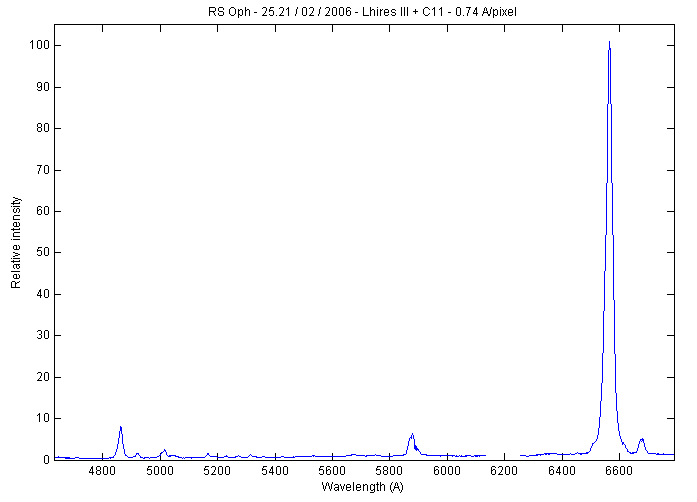
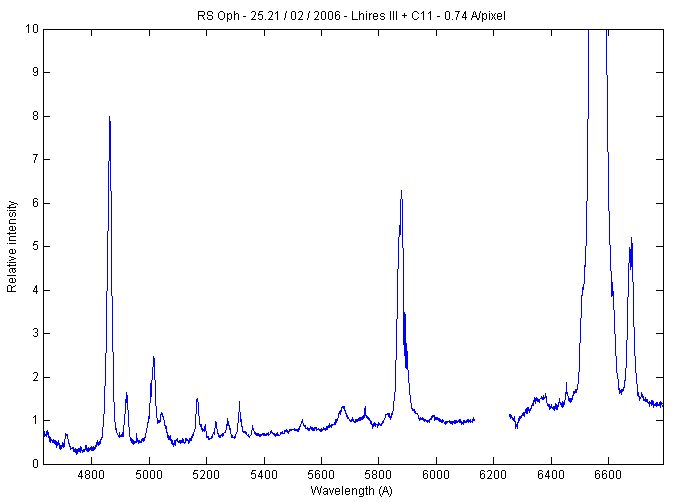
Details:
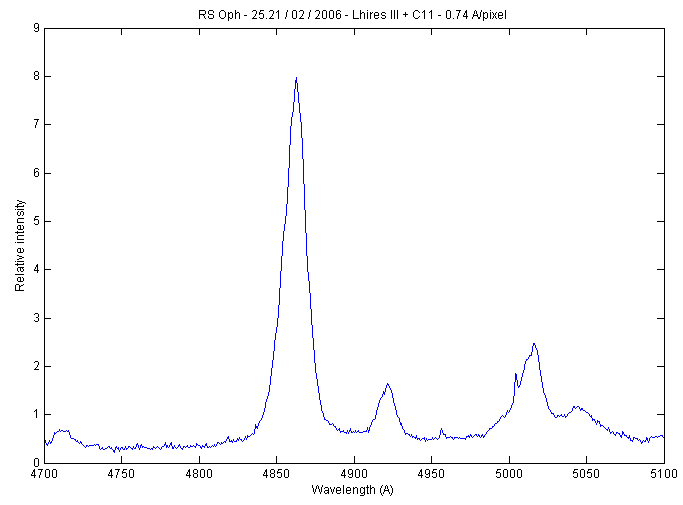
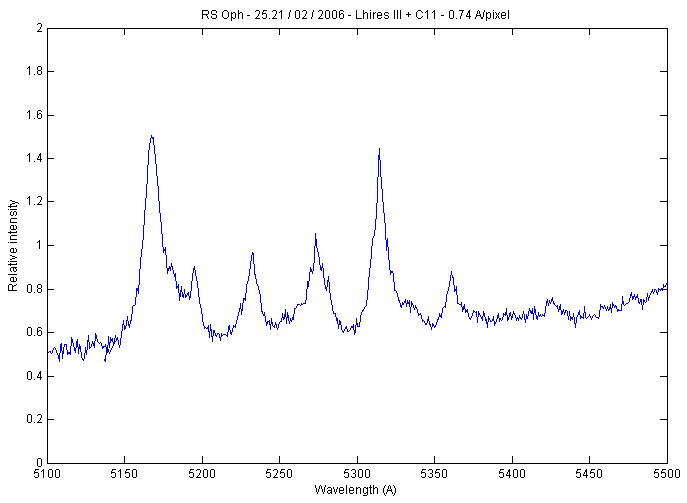
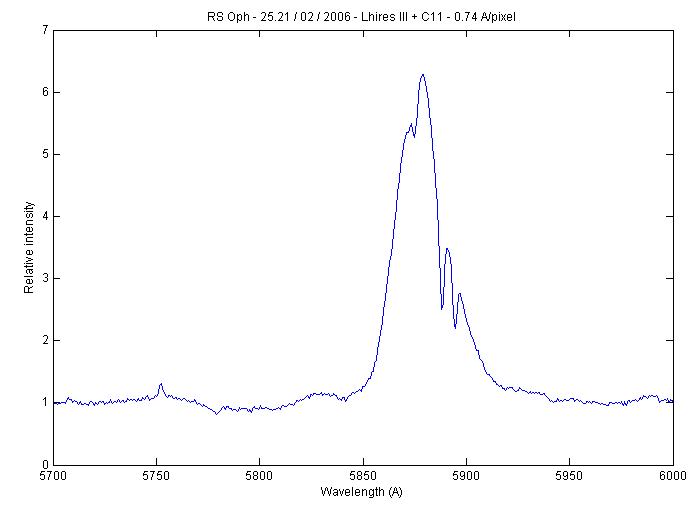
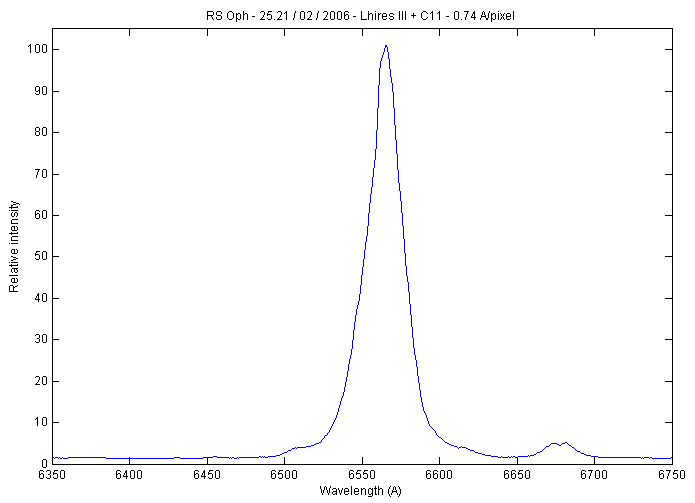
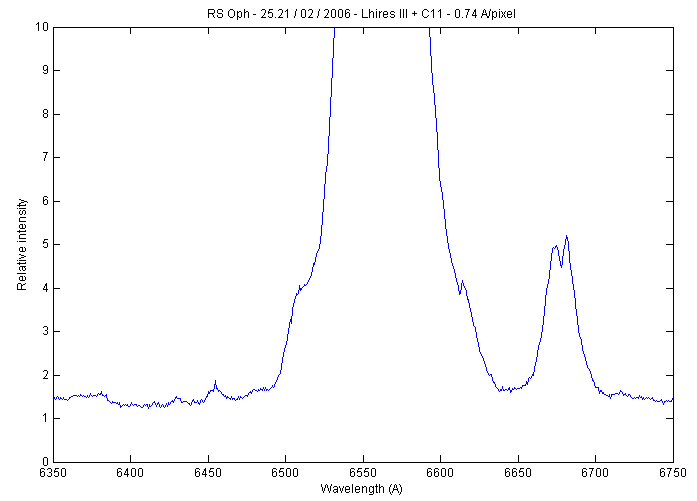
Comparison of the Feb. 14 (0.11 A/pixel) and Feb. 25 (0.74 A/pixel) spectra (normalized at the same wavelength):
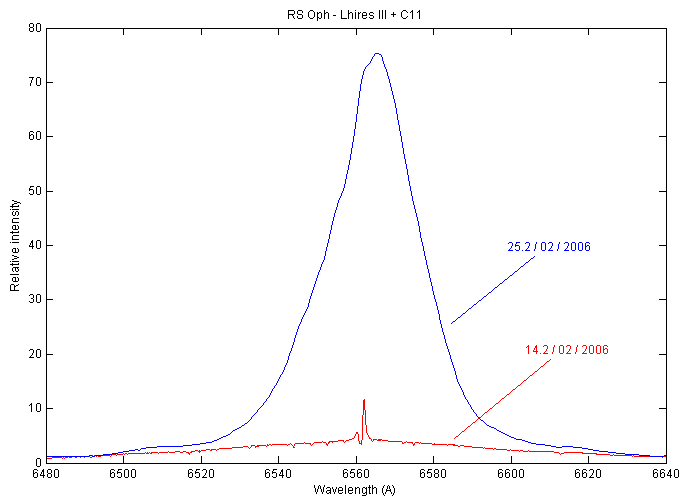
Equivalent
Width (EW) the February 25: EW = 2100 Angstroms.
February 28.17 UT 2006 Observation (at V magnitude near 7.2)
Observatory: Castanet Tolosan (France)
- IAU959
Observer: Christian Buil
Instrument: Celestron
11 telescope (0.28 m diameter) -LHIRES3
spectrograph with a 600 g/mm grating (sampling of 0.74 A/pixel) + Audine KAF-0402ME CCD.
Three individual spectra are assembled for cover the actual spectral range. Exposure
time: 5x300 s.
The full observed range:
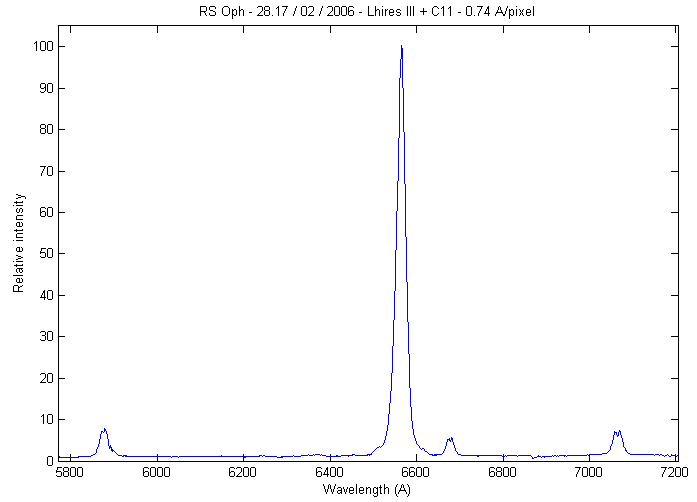
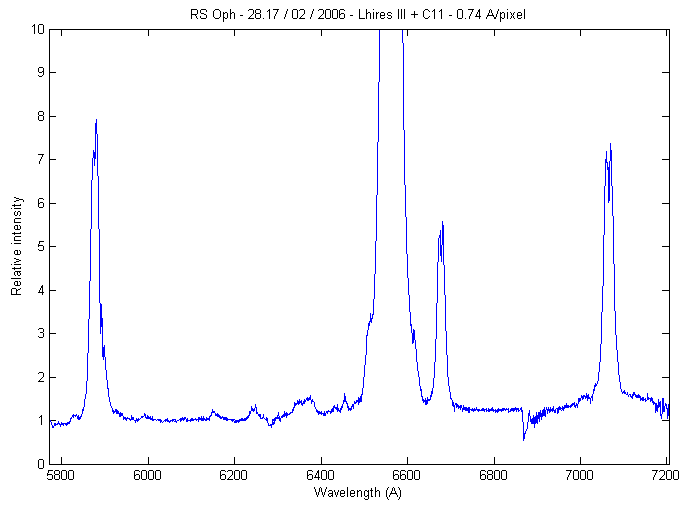
Details: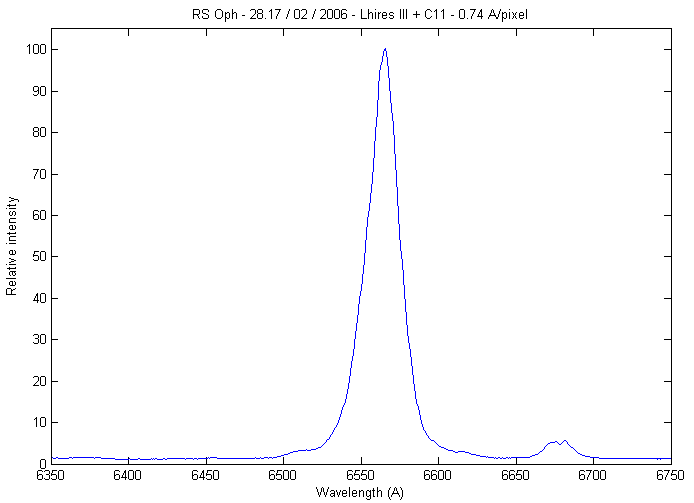
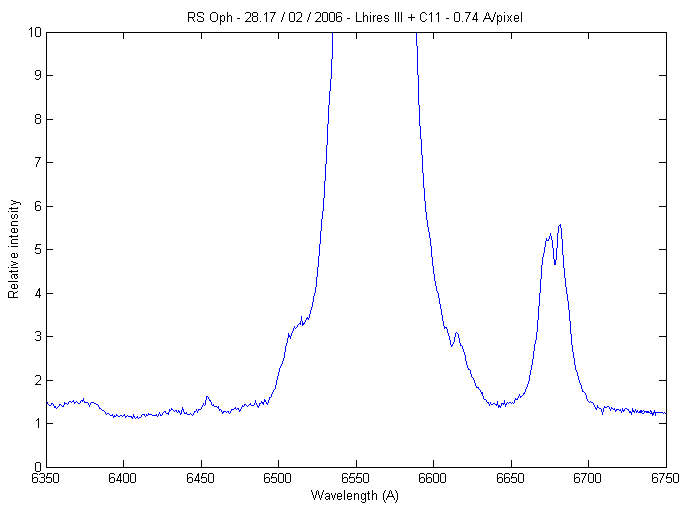
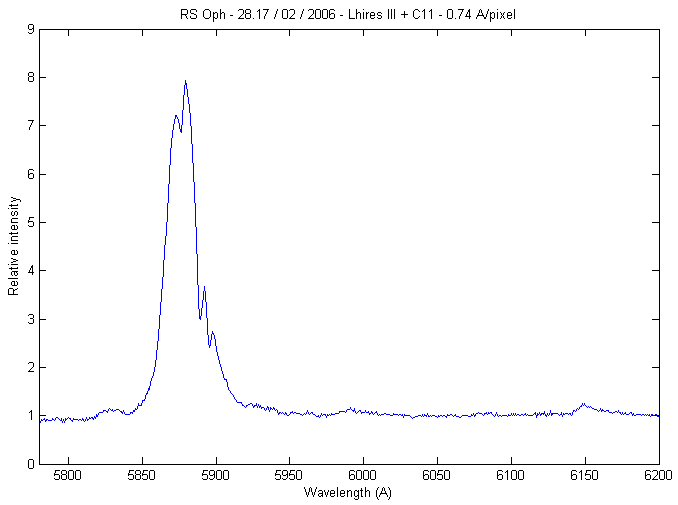
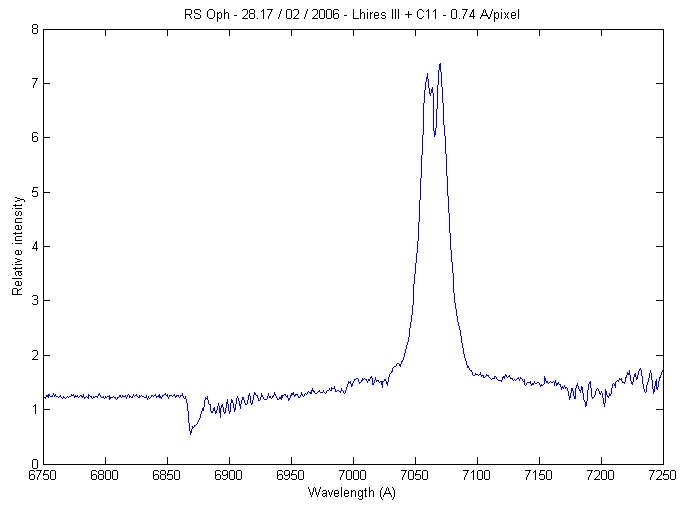
The
H-alpha and HeI 5876 A, HeI 6678 and HeI 7066 dominate the covered spectral
range.
Comparison of the Feb. 25 and Feb. 28 spectra: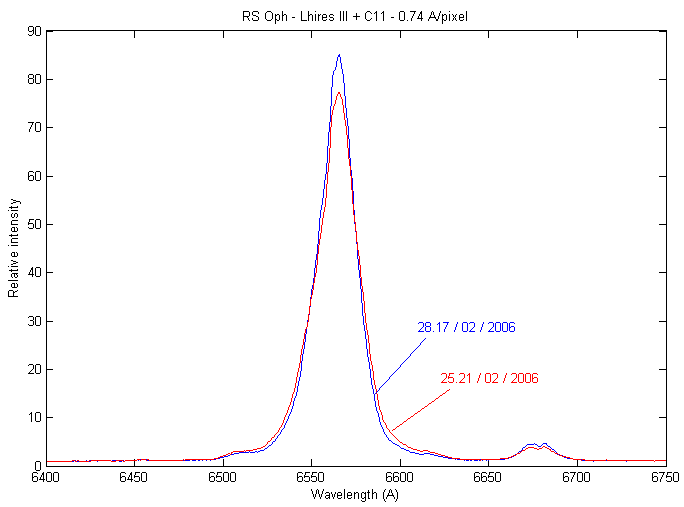
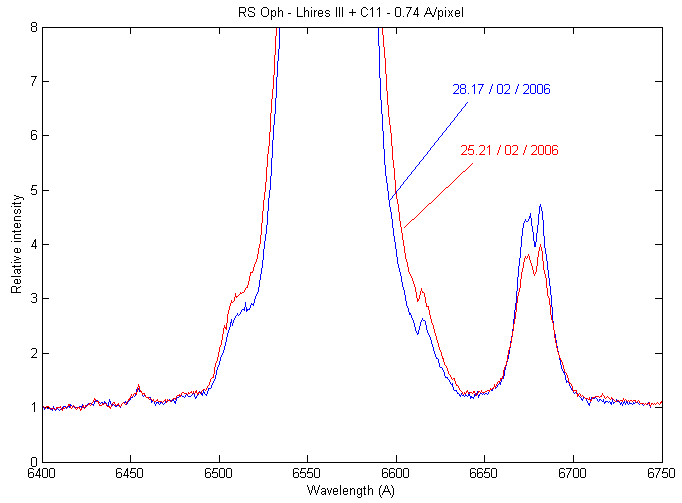
March 13.181 UT 2006 Observation (at V magnitude near 9.0)
Observatory: Castanet Tolosan (France)
- IAU959
Observer: Christian Buil
Instrument: Celestron
11 telescope (0.28 m diameter) - LHIRES3
spectrograph with a 150 g/mm grating (sampling of 2.99 A/pixel) + Audine KAF-0402ME CCD.
Three individual spectra are assembled for cover the actual spectral range. Exposure
time: 8x120 s. Normalized at wavelength 5600 A and rectified for the instrumental response.

2D
spectrum. Artificially colored.
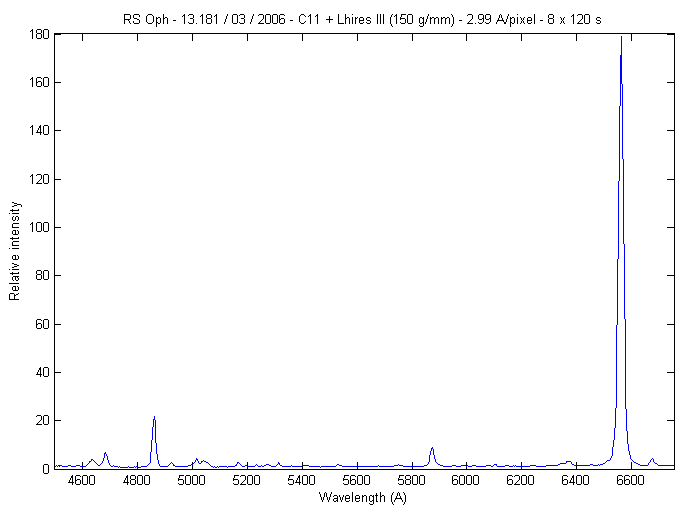
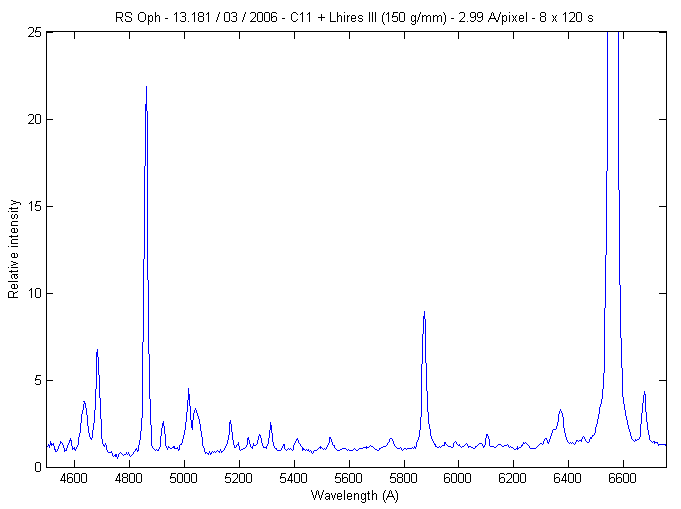
March 15.124 UT 2006 Observation (at V magnitude near 9.0)
Observatory: Castanet Tolosan (France)
- IAU959
Observer: Christian Buil
Instrument: Celestron
11 telescope (0.28 m diameter) - LHIRES3
spectrograph with a 2400 g/mm grating (sampling of 0.115 A/pixel) + Audine KAF-0402ME CCD.
Exposure
time: 16x300 s. Normalized with the aim of the March 13 observation. H2O telluric
lines are removed.
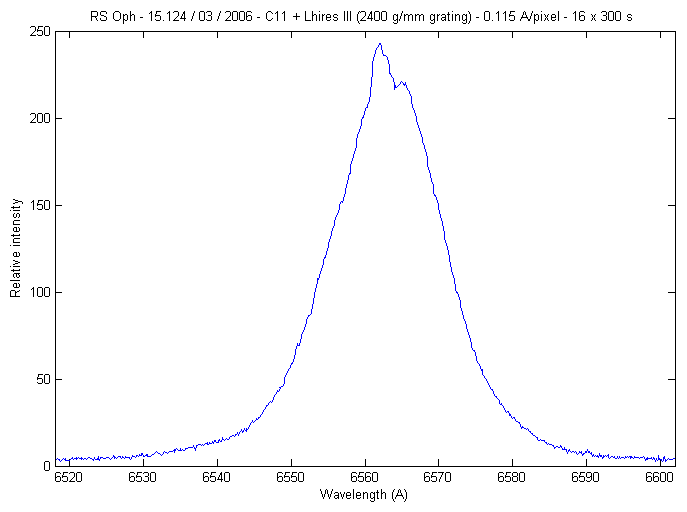
The setup used (morning of 14 February 2006):
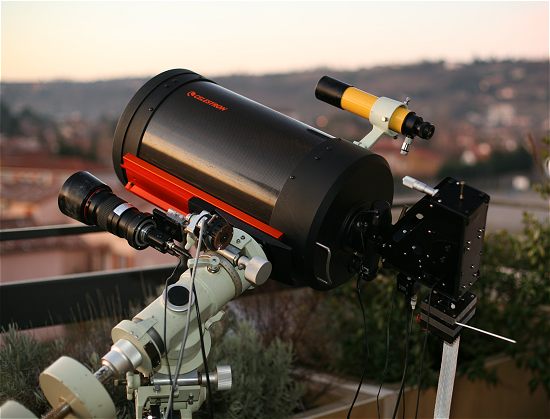
Download
14/02/2006
spectrum
25/02/2006 spectrum
28/02/2006
spectrum
13/03/2006 spectrum
15/03/2006
spectrum
August 15.824 UT 2010 Observation (at V magnitude near 11.0)
Observatory: OHP
Observer: Christian Buil
Instrument: Celestron
9 telescope (0.235 m diameter) - LISA
spectrograph (R=620) + QSI583
CCD camera.
Exposure
time: 7x600 s.
Donwload spectrum: _rsoph_20100815_825.dat
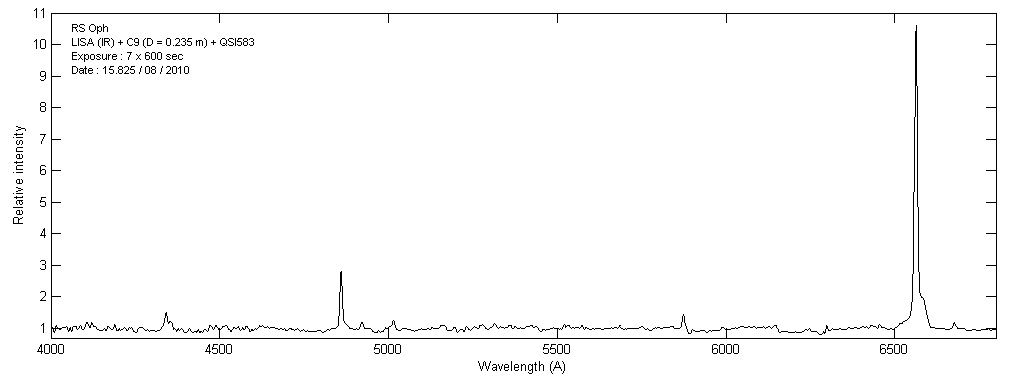
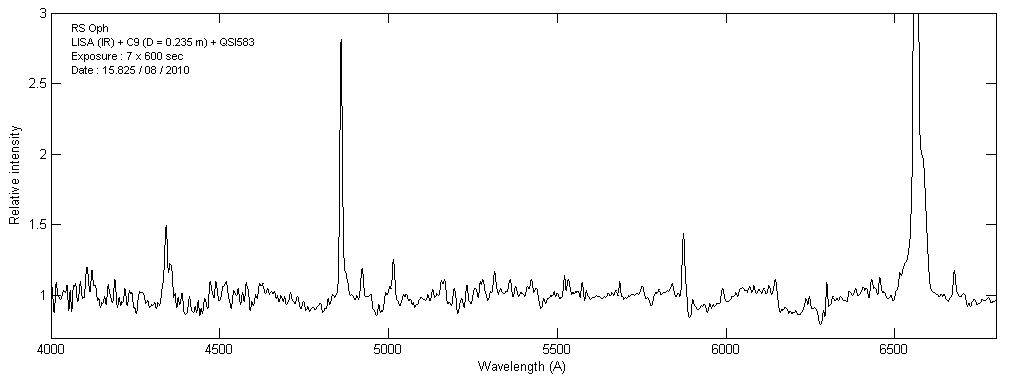
March 23.102, 2011 Observation
Observatory: Castanet-Tolosan
Observer: Christian Buil
Instrument: Celestron
11 telescope (0.280 m diameter) - LISA
spectrograph (R=600) + QSI583
CCD camera.
Exposure
time: 5x600 s.
Donwload spectrum: _rsoph_20110323_102.dat 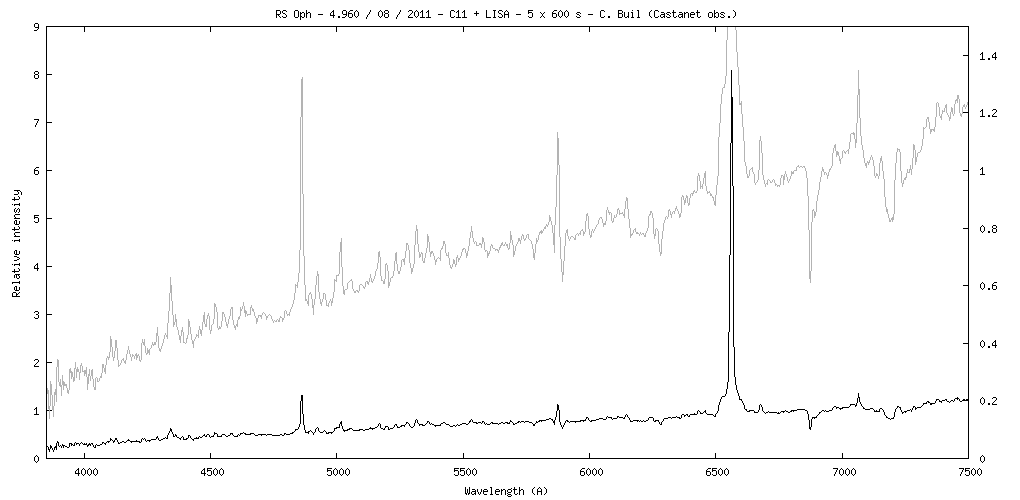
August 4.960, 2011 Observation
Observatory: OHP
Observer: Christian Buil
Instrument: Celestron
9 telescope (0.235 m diameter) - LISA
spectrograph (R=750) + QSI583
CCD camera.
Exposure
time: 5x600 s.
Donwload spectrum: _rsoph_20110804_960.dat 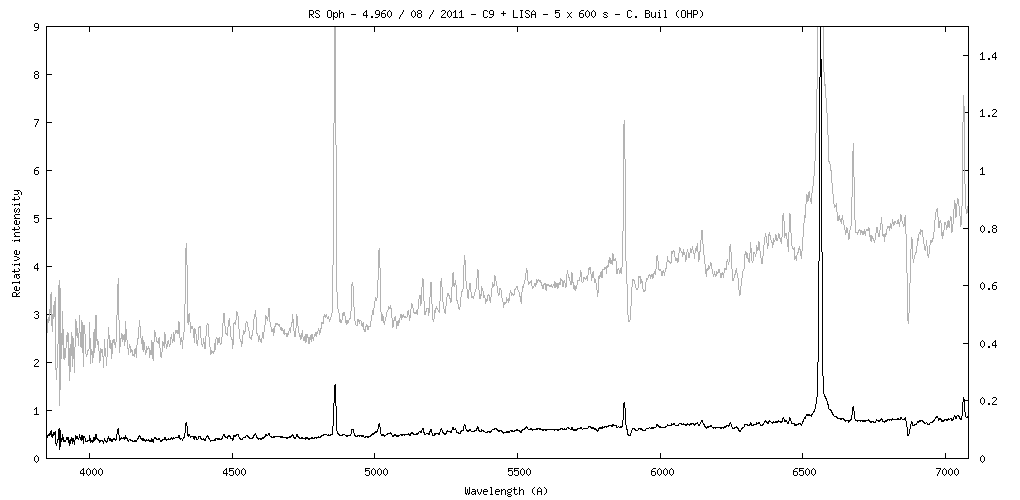
June 26.925, 2012 Observation
Observatory: Castanet-Tolosan
Observer: Christian Buil
Instrument: Celestron
11 telescope (0.28 m diameter) - LISA
spectrograph (R=1000) + Atik314L+
CCD camera.
Exposure
time: 7x300 s.
Donwload spectrum:
_rsoph_20120626_925.fit 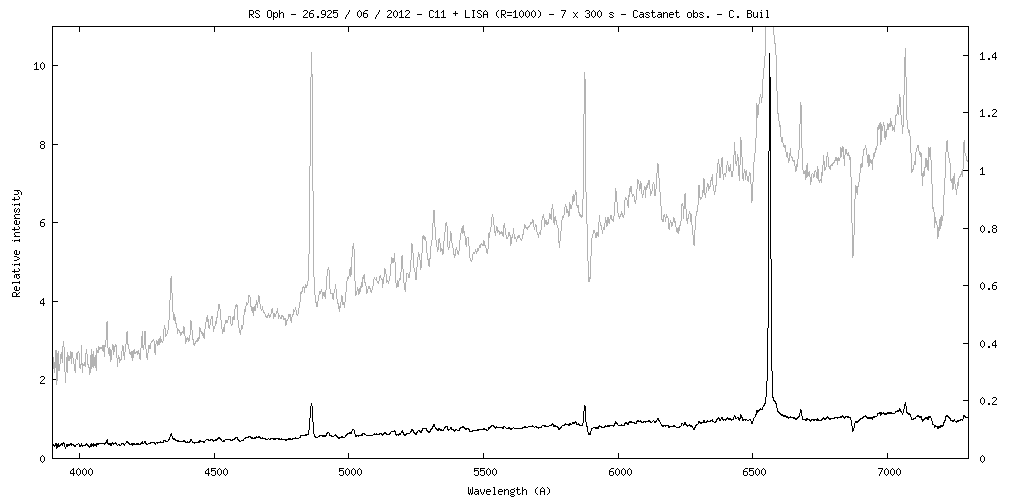
April 3.126, 2013 Observation
Observatory: Castanet-Tolosan
Observer: Christian Buil
Instrument: CN212
(0.212 m diameter) - Alpy
600
spectrograph (R=600) + Atik460EX+
CCD camera.
Exposure
time: 4x600 s.
Donwload spectrum: _rsoph_20130403_126_cbuil.fit 